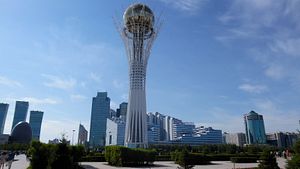Russia’s lease of the Baikonur cosmodrome in Kazakhstan, at $115 million per year, extends until 2050. Although Russia’s new spaceport, the Vostochny cosmodrome in the Far East, saw its first successful launch in April, the facility is a long way from completion and already behind schedule. Periodic reports that Russia intends to leave Baikonur before 2050–such as news last summer that Russia would move manned launches to Vostochny in 2024–ought to be taken with a grain of salt. A considerable number of things may, or may not, happen between now and 2050 that will impact Russian-Kazakh cooperation (in space and on terra firma).
To put those periodic reports in context, it’s useful to look at the evolution of the Baiterek project (which shares its name with the iconic “tall poplar” tree monument in Astana). It quite firmly fits the mold of a “political football.”
The project, a joint venture between Kazakhstan and Russia co-located with Baikonur, was ostensibly begun in 2004 to construct a national launchpad for Kazakhstan’s own stellar ambitions. The project, according its website, aims to develop the “environmentally friendly launch vehicle[s]” of the Angara family of rockets. The Angara is being developed with the existing Proton rocket family in mind–a rocket many in Kazakhstan have objected to due to its highly toxic fuel, cost, and periodic failures. But the Angara, Russian sources have said, will be used and developed at Vostochny starting in 2021.
Last week, TASS reported triumphantly that Russia and Kazakhstan had agreed how to implement the Baiterek project.
“We have reached understanding on how to implement the Baiterek joint project, which is vitally important for both countries,” Russian Vice Premier Dmitry Rogozin said. A final decision on future plans is expected in September.
Despite this optimism, the years between 2004 and 2016 were filled with either no news or arguments over funding models, not to mention the vanishing of Ukraine from the project.
As it stands now, Baiterek is funded fully by Kazakhstan with Russian contributions of technical expertise. In 2005, it was expected that Kazakhstan would commit $233 million over 19 years to the project, with an estimate that construction would take four years. But by 2010 little had been done, the project was stalled. Richard Orange reported for the Telegraph that the 2008 loss of control over Kazakhstan’s first satellite–which spun off and disappeared into space only two years after its much-celebrated launch–“coincided with funding being pulled from Baiterek.”
In early 2012, the chairman of the National Space Agency of Kazakhstan, Talgat Musabayev, commented on news that Russia would use the Angara rocket at Vostochny. “Without the interest of the Russian side in creation of Baiterek space rocket complex its further implementation will become inappropriate for Kazakhstan, as ground complex for Angara rocket carrier created at Vostochniy cosmodrome will be the direct competitor of Baiterek ground space rocket complex,” he said.
By the end of 2012, a source in Russia’s Roscosmos Space Agency told Izvestia, a Russian newspaper, “The probability of the Baiterek project being brought to life is close to zero.” The Kazakhs were apparently pushing for joint funding for the project they’d labeled a major objective but “refused to finance.”
At the same time, the Roscosmos source said Kazakhstan was looking at the Ukrainian-made Zenit rocket for Baikonur. In the next few years the facility moved ahead and not much news trickled out. By 2014–as the Ukrainian crisis ruptured relations–Kazakh state news agency Kazinform reported that “Kazakhstan and Russia still plan to use Ukrainian carrier rocket Zenith at the joint space rocket complex Baiterek.”
Over a year later, however, the story changed. A Sputnik article from late 2015 cited Rogozin: “[Russia and Kazakhstan] decided to create a joint research group that will work over the next two months and give proposals on the most optimal rocket carrier to use that we have today, which is the Proton, Soyuz, and the Angara, which is currently under tests.” That story pegged 2021 as the completion date for Baiterek, caveated heavily with a Kazakh official saying “but possible economic corrections are possible due to the unstable situation in the world.”
The change in tone and course is interesting to say the least. It points to both the project’s immense importance for Kazakhstan and the necessity of Russia’s assistance in bringing the country’s space program into independence. So much, however, happens behind closed doors, which obscures our ability to fully understand what decisions are made. Russia will likely remain at Baikonur until its lease is up in 2050, but a considerable number of things can (and will) happen between now and then. Astana hopes one of those things is the completion of Baiterek.

































